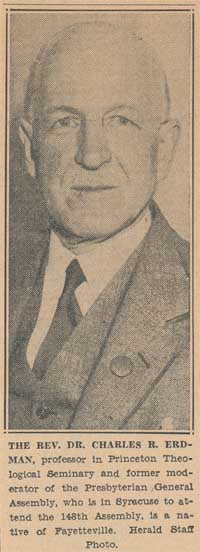This Day in Presbyterian History:
A Plea for Ministers and Money
Most of us can remember Paul’s vision which he experienced on his second missionary journey of a man who called out to the apostle, saying, “Come over to Macedonia and help us.” (NIV – Acts 16:9) Well, we don’t have any record of any visionary request for help, but early Presbyterians in this blessed land did correspond with Presbyterians in the mother country just two years after the organization of the Presbytery of Philadelphia in 1707. There is a letter written on May 11, 1709 to Presbyterians in London, England from the Presbyterian ministers in the Philadelphia Presbytery appealing for more men and money to help the infant Presbyterian Church get off the ground. Listen to the pathos in their words:
“Unto whom can we apply ourselves more fitly than unto our fathers, who have been extolled in the reformed churches for their large bounty and benevolence in their necessities! We doubt not, but if the sum of about two hundred pounds per annum, were raised for the encouragement of ministers in these parts, it would enable ministers and people to erect eight congregations, and ourselves put in better circumstances than hitherto we have been. We are at present seven ministers, most of whose outward affairs are so straightened as to crave relief, unto which, if two or three more were added, it would greatly strengthen our interest, which does miserably suffer, as things are at present are among us.
“Sir, if we shall be supplied with ministers from you, which we earnestly desire; with your benevolence to the value above, you may be assured of our fidelity and Christian care in distributing it to the best ends and purposes we can, so as we hope we shall be able to give a just and fair account for every part of it to yourself and others, by our letters to you.
“That our evangelical affairs may be the better managed, we have formed ourselves into a Presbytery, annually convened. It is a sore distress and trouble unto us, that we are not able to comply with the desires of sundry places, crying unto us for ministers. Therefore we earnestly beseech you to intercede with the ministers of London, to extend their charity to us, otherwise many people will remain in a perishing condition as to spiritual things.”
It is obvious that the seven ministers of the Presbytery of Philadelphia certainly saw that the fields of America were ripe unto harvest. They also sadly realized that the laborers were few so as to reap that spiritual harvest. And so they, in a spirit of prayer, asked for both ministers and money to take advantage of the opportunities for a wide and effective service in the American colonies.
It would be at a later date in the history of the American church, indeed several decades from this date, that the question of where you were trained educationally became an issue in the visible church. But at this early date in American Presbyterian history, they were at a critical crossroads, as the letter above proves. They needed more pastors and more money to support those who were present in ministering to the masses.
Words to Live By: Such a prayer and plea as this is never outdated, even in current America. We might add the adjective “faithful” before the men who are needed in our conservative Presbyterian and Reformed church bodies, but the need is the same. Will you be a prayer warrior before our Sovereign God and heavenly Father for Him to thrust out faithful laborers into the harvest fields?
Through the Scriptures: Psalms 91 – 93
Through the Standards: The principal acts of saving faith
WCF 14:2
“By this faith, a Christian believes to be true whatsoever is revealed in the Word, for the authority of God Himself speaking therein; and acts differently upon that which each particular passage thereof contains; yielding obedience to the commands, trembling at the threatenings, and embracing the promises of God for this life, and that which is to come. But the principal acts of saving faith are accepting, receiving, and resting upon Christ alone for justification, sanctification, and eternal life, by virtue of the covenant of grace.”



